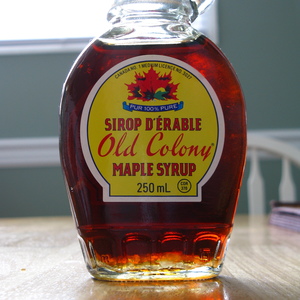A basic rule of economics is that the price of products increases when demand exceeds supply, and the price decreases when supply exceeds demand. But producers can tinker with that formula. If they want to get around the supply-and-demand cycle, they can stockpile supplies and decide how much of a product to make available for consumers. Listen to find out how maple syrup producers in Quebec, Canada keep prices high for this prized commodity.
Listen to the story
AILSA CHANG: The most expensive commodity on your breakfast table is probably not the heirloom pork or the artisanal coffee or even the free-range eggs. It is probably the maple syrup. Ounce for ounce, maple syrup is worth more than oil. It’s worth so much that the Canadian province of Quebec has its own strategic reserve of the stuff like a Fort Knox for maple syrup spread out over three separate sites.
Vermont Public Radio’s Jane Lindholm joined Stacey Vanek Smith of our Planet Money Indicator team recently and took a visit to the reserve. They bring us this story of how a delicious stockpile can impact an entire global industry.
JANE LINDHOLM: My home state of Vermont really likes to play up its role as the United States’ largest producer of maple syrup. Stacey, we made about 20 million pounds of syrup in 2018.
STACEY VANEK SMITH: That is just nothing compared to Vermont’s neighbor to the north, Quebec, because that one Canadian province alone made 118 million pounds of maple syrup in 2018. That is more than 70 percent of the entire world’s supply.
LINDHOLM: And it’s so important to Canada that there’s actually a global strategic reserve. It’s full of barrels upon barrels of maple syrup. I actually went to go see what it looks like. I popped up over the border and went to this small town called Laurierville.
CAROLINE CYR: (Speaking French).
LINDHOLM: That’s Caroline Cyr. She works on the communications team for the Maple Syrup Producers of Quebec, and she took me on the path a barrel of syrup takes through the warehouse.
CYR: Here we are in the space where the producers can deliver their maple syrup in barrels. There’s big squares on the floor. Those are scales because we need to weigh every barrel.
VANEK SMITH: So in Quebec, anyone who wants to sell in bulk has to contribute a portion of their finished maple syrup to this reserve. And they don’t get paid for it, at least not right away.
LINDHOLM: So why would any farmer agree to wait to get paid for their product – because the global strategic reserve is actually a way to guarantee that high, high price for maple syrup by removing – totally removing the natural boom-and-bust cycle that would otherwise happen for an agricultural commodity. So in 2004, the Federation of Quebec Maple Syrup Producers created a quota system controlling production. And then they created this global strategic reserve to make sure that the supply never runs dry.
VANEK SMITH: The producers are pretty much reaping the rewards of a system that keeps the price high and, you know, makes their business a lot more predictable. And Cyr says exports have hit records every year for the last five or six years. And most of that syrup is going to one place in particular.
CYR: For sure it’s your country (laughter) – United States. We send 62 percent of our maple syrup exportation to your country, so thank you.
LINDHOLM: But it’s not totally flawless. In 2008, the reserve went totally dry. They just kept selling out of the reserve, and there was suddenly no more syrup. And so that sent the federation into total panic mode, and they released more of these licenses in 2009. Global demand has continued to increase, so they gave out another round in 2016 for about 5 million new taps. And Stacey, the total amount in the reserve is worth 280 million Canadian dollars. That’s more than 200 million U.S. dollars.
VANEK SMITH: That’s an incredible amount of money.
 © 2019 National Public Radio, Inc. Used with the permission of NPR. All rights reserved.
© 2019 National Public Radio, Inc. Used with the permission of NPR. All rights reserved. Vocabulary
- commodity (n) – a product that can be bought and sold
- reserve (n) – a supply of a commodity that is saved for future use
- boom-and-bust cycle (n) – a period of economic prosperity followed by a period of economic decline
- quota (n) – a fixed amount that cannot be exceeded
- federation (n) – an organization comprised of smaller entities that have some autonomy and are subject to some centralized control
Listening Comprehension Questions
- What evidence supports the idea that maple syrup is important to Quebec’s economy?
- Why does Quebec keep a reserve of maple syrup?
- Who decided that Quebec’s maple syrup producers need to contribute to the reserve? Why?
- How does the reserve affect the price of maple syrup?
- How does the reserve benefit maple syrup producers? What might be challenging for them about contributing to the reserve?
Discussion Themes
- What are the potential pros and cons of the maple syrup reserve for Quebec’s producers?
- If you were a Quebec maple syrup producer, would you be pleased to contribute to the reserve? Why or why not?
Teacher’s Guide
Activate student knowledge: Open class by asking students if they like maple syrup, and if they have had real maple syrup or only used maple-flavored syrup. Explain that real maple syrup is very expensive, so many people buy a less-expensive alternative. In fact, many restaurants charge extra if you want real maple syrup with your pancake or waffle. Ask students: Would you pay extra for the real thing? Think about why some people are willing to pay high prices for a product like maple syrup. You can also make a comparison to the cost of other “fake” products such as imitation designer handbags versus the cost of real designer handbags.
Introduce the story: In this audio story, you will learn about maple-syrup producers in Quebec who do not send to market all the syrup they produce. Listen to hear why they purposely keep a reserve of this valuable commodity.
Active listening supports:
- The True or False? organizer helps students focus their listening.
- The Language Identification organizer allows students to follow along and track important phrases while listening to the story.
Reflect on the story: Take time for student reflection on the audio story and discussion questions to check for understanding about the role of supply and demand in prices.
Paired Text: Use the Vermont Business Magazine article “Quebec losing ground in maple syrup production to Vermont” to pair with this audio story. Ask students to compare the viewpoints of the two reports. Compare and contrast the information learned from the text and the audio.


